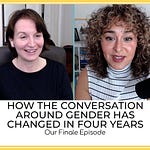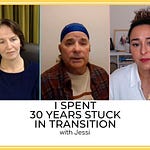Are stereotypes always harmful? Should we use stereotypes to predict and impose behaviors and preferences onto others? Some people believe transgender identities defy stereotypes while others believe they reify them. And where does stereotyping come from? This is a mental shortcut with complex roots and crucial implications for the gender debates.
Links:
Carole Hooven: Testosterone: The Story of the Hormone that dominates and Divides Us
Noam Shpancer: Stereotype Accuracy: A displeasing truth
Extended Notes
There are so many stereotypes in this space. What’s the right definition of gender dysphoria? The DMS is just riddled with stereotypes.
Stella reads out the DMS description of gender dysphoria.
The first six descriptors of gender dysphoria in the DMS are very stereotypical. It’s fixed with what a boy should play vs. what a girl should play.
Why are pink colors “girlish” and why are blue colors “boyish”?
What are some common stereotypes about women? Or even Irish people?
What frustrates Stella the most about stereotypes?
Stereotypes are always framed as harmful in this community, yet they also use them extensively. It’s a bit of a contradiction.
These stereotypes really do come from somewhere. There’s a reason why these exist.
Stella and Sasha compare their culture and differences.
Our brains use stereotypes to keep us safe.
Both sides are claiming they’re breaking the stereotypes down, but are they?
There are girls who are wearing makeup and are in girls’ clothing, but they are saying they identify as trans guys. What’s going on? It’s a huge mind pretzel.
It’s confusing, they say “treat me like a man,” but what does that mean if it’s outside of a stereotype?
There’s a mix between medical and rebellion language and, when it comes to gender, this is very scary.
If you call a phone a duck and still call a duck a duck, what the heck are we actually talking about?
Free speech is everything and trying to control or change speech, even in its respect to gender, is dangerous.
Stereotypes have a certain level of efficiency towards understanding what another person means.
Kids are resident stereotypes all the time, but they also seek out edgy and cool ones to be a part of. Their own tribe, if you will.
When they feel like a stereotype is “off-limits,” Sasha wonders how that can impact the development stages of a child if they feel like they can’t be whole or have to shun parts of their identity to fit in.
There’s a subcategory of feminists who feel driven to be sexually liberated and proud to sleep with multiple, multiple people, but Stella and Sasha ask questions on why that is.
This podcast is partially sponsored by ReIME, Rethink Identity Medicine Ethics:
Learn more about our show: Linktr.ee/WiderLensPod











